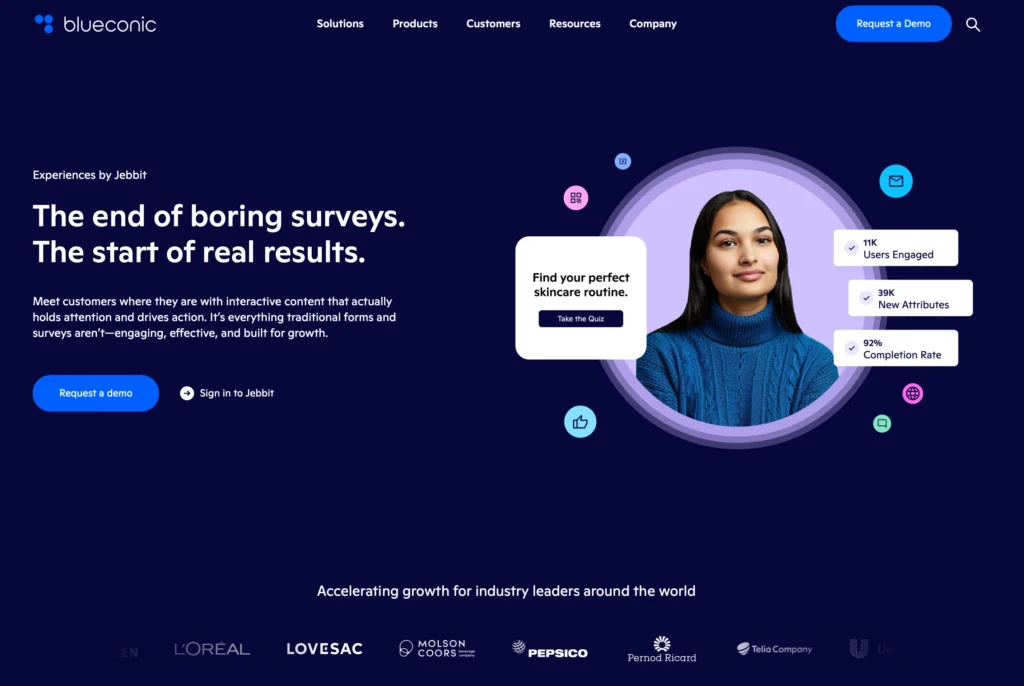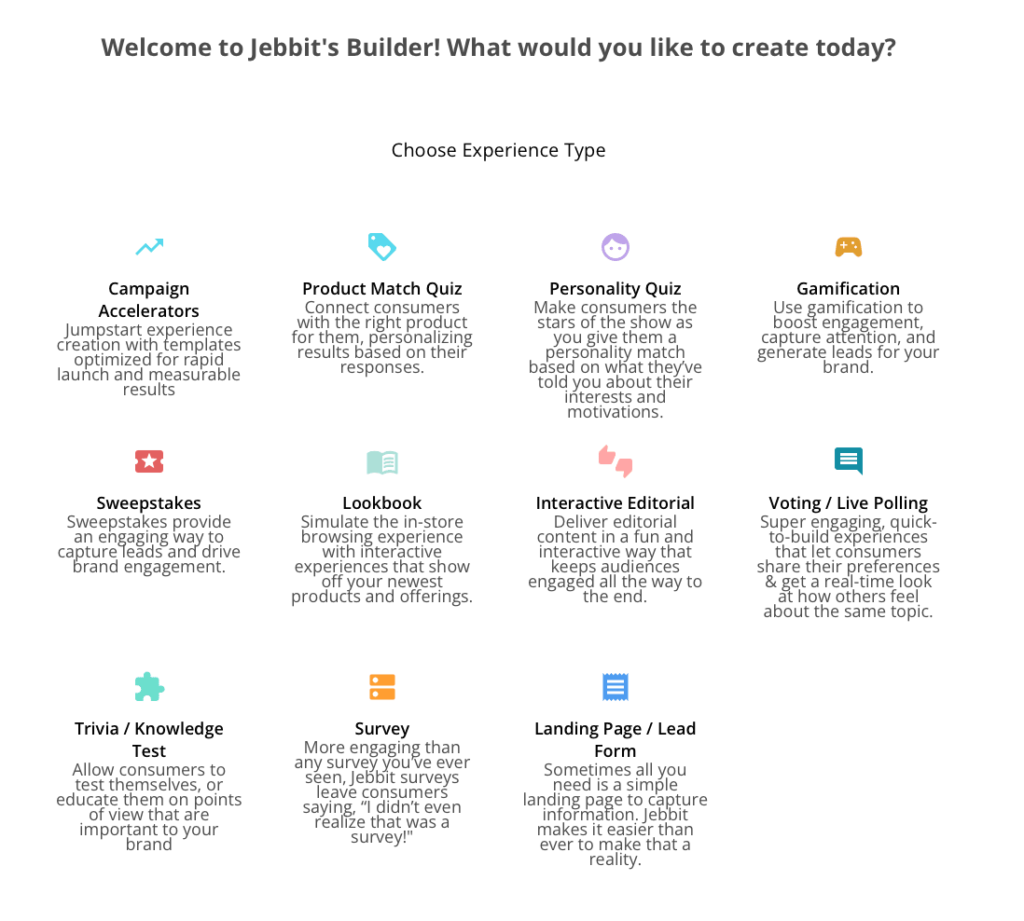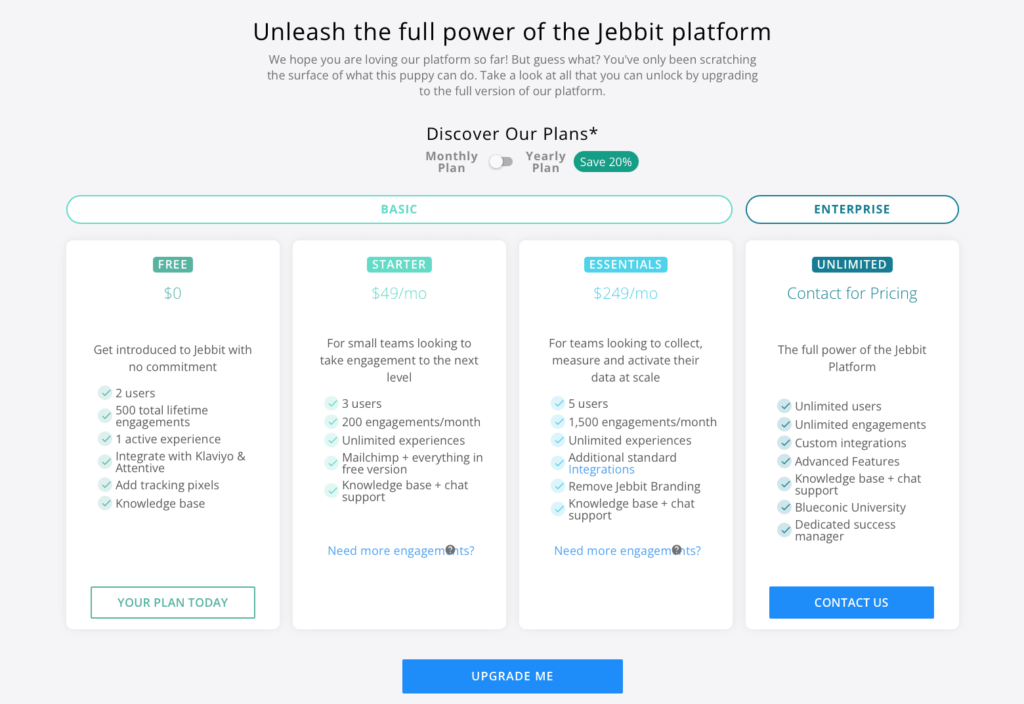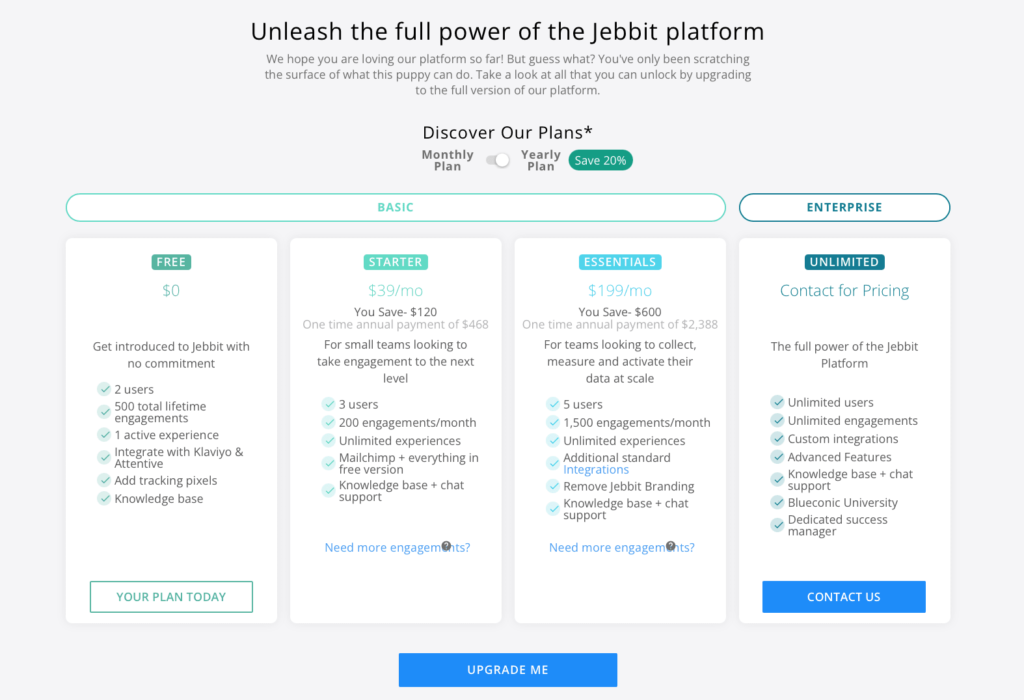In a world where third-party cookies are disappearing, marketers are scrambling for a new way to collect valuable customer data. That’s where Jebbit comes in. This platform is not just a quiz builder; it’s a powerful tool for generating and capturing declared, or “zero-party,” data directly from consumers. We’ve put Jebbit to the test, building everything from interactive quizzes and personality tests to product recommendation engines. Here’s a full breakdown of what we found, helping you determine if Jebbit is the right solution for your lead generation and customer engagement needs in 2025.
Table of Contents
Quick Verdict
Pros:
- ✔ Industry leader in capturing **zero-party data** for marketing.
- ✔ **Unlimited experiences, leads, and traffic** on all paid plans.
- ✔ Highly customizable experiences with dynamic content.
- ✔ Enterprise-grade **API access** and advanced integrations with marketing CRMs.
- ✔ **No-code** builder makes it easy for marketers to use.
Cons:
- ✖ The **high price point** makes it inaccessible for small businesses.
- ✖ Lacks a free, non-trial plan.
- ✖ Overkill for simple survey or poll needs.
- ✖ Interface can have a slight learning curve compared to simpler tools like Typeform or Tally.
What is Jebbit?
Jebbit is an interactive experience platform designed to help brands capture **declared data**, also known as first-party or zero-party data. It was recently rebranded as blueconic. Unlike traditional surveys from tools like SurveyMonkey or forms from Tally that simply ask for information, Jebbit creates engaging, branded experiences—such as quizzes, trivia, product finders, and interactive lookbooks—that encourage consumers to volunteer information about their preferences, interests, and motivations. This data is “declared” because the user is knowingly and willingly providing it. This is a game-changer for marketers in a privacy-first world, as it bypasses the need for third-party tracking and builds a direct, trust-based relationship with the customer. While other platforms like Typeform and Apestor also offer interactive quizzes, Jebbit’s core focus is on the marketing applications of the data collected, making it a more robust solution for businesses that want to use this data to personalize and optimize their customer journey.
For example, a fashion brand could use a Jebbit quiz to help customers find their personal style, and in the process, collect declared data on their color preferences, favorite looks, and sizing. This information can then be used for personalized email campaigns, ad retargeting, and dynamic content on their website. It’s a powerful engine for lead generation and customer segmentation that goes far beyond what a simple poll from a tool like Mentimeter could achieve.

Key Features
Jebbit’s feature set is built to support the creation and deployment of highly effective interactive experiences.
- Unlimited Experiences, Leads & Traffic: A major selling point for Jebbit is that every paid plan includes **unlimited experiences**, **unlimited leads**, and **unlimited traffic**. This is a significant advantage over competitors that charge per engagement or form completion, such as SurveyMonkey. You can run as many campaigns as you want without worrying about hitting a cap, which is perfect for high-volume marketing efforts.
- Fully Customizable Experiences: The platform allows you to create completely branded experiences. You can use your existing fonts, brand colors, and assets to ensure every experience feels like a natural part of your brand ecosystem. The platform also supports **dynamic content**, which allows you to change the content of an experience based on a user’s answers in real time. For example, a quiz about skin type can dynamically show different product recommendations based on whether the user has dry, oily, or combination skin. This level of customization is far more advanced than what you might find in a standard quiz maker like Riddle or Qzzr.
- Advanced Integrations & API Access: Jebbit’s strength lies in its ability to connect with your existing marketing stack. All paid plans come with advanced integrations, allowing you to seamlessly sync the declared data you collect with your CRM, marketing automation platforms, and other business intelligence tools. The Standard and Enterprise plans include **API access**, which gives you maximum flexibility to create custom connections and automate workflows.
- Advanced Analytics & User Permissions: Jebbit provides in-depth analytics to help you understand the performance of your experiences. The Standard and Enterprise plans include **advanced analytics** and **user permissions**, which are essential for teams that need to collaborate on projects and control access to sensitive data.
- No-Code Builder: Despite its advanced capabilities, Jebbit’s builder is designed to be **no-code**. This means that marketers and non-technical users can build complex interactive experiences without needing a developer, which saves time and resources.
Ease of Use & Interface
Jebbit’s interface is powerful, and with that power comes a slight learning curve. It’s a drag-and-drop, visual builder that guides you through the process of creating an experience from start to finish. You begin by selecting a template or starting from scratch, and then you add different “screens” (pages) to your experience. The platform’s terminology—using “screens” instead of “questions” or “forms”—highlights its focus on building an interactive narrative. The logic and branching options, while robust, are intuitive for a marketer. If you’ve used other quiz-makers like involve.me or Riddle, you’ll find the concepts familiar, but Jebbit’s interface feels more geared toward high-volume, brand-centric marketing campaigns. While it may not be as simple to get started with as Tally or a basic SurveyMonkey form, the depth of customization and the power of its features make the initial learning curve well worth it for serious marketers.

Pricing & Plans
Jebbit’s pricing is not for the faint of heart; it’s clearly targeted at enterprise-level businesses and marketing teams with significant budgets. The pricing model is based on a yearly subscription, with a monthly option also available at a higher cost.
- Starter Plan: The Starter plan is priced at **$1,595 per month when billed annually**, or **$1,995 per month when billed monthly**. It includes unlimited experiences, leads, and traffic, which is impressive. It also comes with the core features like custom branding and advanced integrations.
- Standard Plan: The Standard plan costs **$2,395 per month when billed annually**, or **$2,995 per month when billed monthly**. This tier includes all the Starter features plus advanced analytics, user permissions, and API access. This is the recommended plan for teams that need to integrate Jebbit deeply into their tech stack and collaborate effectively.
- Enterprise Plan: The Enterprise plan is **custom-priced** and offers the most advanced features, including custom integrations, managed services, and dedicated support. This plan is designed for large corporations that need a tailored solution to meet their specific security and scale requirements.
It’s important to note that Jebbit does not have a free plan like Typeform or Tally. Instead, it offers a free trial to let you test the platform before committing to a hefty price. This pricing structure positions Jebbit as a premium solution, much like enterprise-grade software, and is a major differentiating factor when compared to more accessible, freemium tools like ProProfs or SurveyMonkey.


Pros & Cons
Pros:
- Zero-Party Data King: Jebbit’s core value is its ability to collect declared data, which is crucial for modern marketing and personalization efforts.
- True Unlimited Use: Unlike other platforms that limit you by form count or submissions, Jebbit’s promise of **unlimited experiences, leads, and traffic** on all paid plans gives you peace of mind.
- Seamless Integrations: The platform’s robust integration capabilities ensure that the declared data you collect can be seamlessly fed into your existing CRM and marketing automation systems.
- Highly Customizable: The no-code builder allows for a high degree of customization, ensuring your interactive experiences are on-brand and professional.
- Powerful for Marketing: Jebbit’s focus on quizzes for product recommendations, lead generation, and customer segmentation makes it a powerful asset for any serious marketing team.
Cons:
- High Price Point: The most significant barrier to entry is the cost. Jebbit’s pricing is not affordable for small businesses or individual users.
- No Free Plan: The absence of a free tier means you can’t use the platform for casual projects or small-scale needs without a significant investment.
- Specific Use Case: Jebbit is an expert tool for a specific purpose. If all you need is a simple form or survey, a more general-purpose tool like Tally or Google Forms would be more appropriate and far more cost-effective.
Final Verdict
Jebbit is not for everyone, but for the right user, it’s an indispensable platform. It’s a high-powered, purpose-built tool that excels at helping brands capture valuable declared data and drive customer engagement at scale. If you are a small business owner or an individual creator who needs a simple form or quiz, this tool is likely overkill and its price tag is simply too high. However, if you are a marketing team at a medium-to-large business that is serious about personalization, lead generation, and building a comprehensive first-party data strategy, then Jebbit is an essential investment.
Final Score: 4.5/5 Stars
Jebbit earns a stellar score for its unique value proposition, unlimited features, and powerful integrations. It’s a top-tier solution that is truly worth the investment for a business that needs to pivot away from reliance on third-party data. It loses a small amount of points for its prohibitive cost and the lack of a freemium plan, which limits its accessibility to a wider audience.
FAQ
Here are some of the most common questions about Jebbit and declared data.
What is the difference between a quiz and an interactive experience?
While a traditional quiz typically tests knowledge and provides a pass/fail score, an “interactive experience” is a broader term that includes quizzes, product finders, trivia, and personality tests. It’s designed to be a mutually beneficial exchange, where the consumer is entertained or educated while the brand captures valuable data.
What is ‘declared data’?
Declared data is information that a customer **intentionally and proactively shares** with a brand. This includes personal interests, preferences, and motivations. It’s also known as zero-party data and is a high-quality, privacy-compliant alternative to third-party data collected through tracking cookies.
How do you calculate engagement?
Jebbit calculates engagement based on a user’s interaction with an experience. An engagement is counted when a user successfully completes the entire interactive experience, such as a quiz or product finder. This is different from a simple page view or form submission, as it indicates a deeper level of participation.
Can I use my existing fonts and brand colors?
Yes, Jebbit allows you to fully customize your experiences to match your brand’s look and feel. All paid plans include the ability to use your brand’s fonts, colors, and other assets to create a seamless and professional experience for your customers.
Can I use Jebbit experiences as ads?
Yes, Jebbit experiences are designed to be integrated into your digital marketing channels. You can use your experiences as lead generation ads, and the data you collect can be used to inform your ad targeting and personalization efforts on platforms like Facebook and Google.
Other Quiz Maker Reviews
Below is a curated list of our in-depth reviews for some of the best interactive content platforms on the market. We’ve ranked them based on a variety of factors including ease of use, features, and value. Our top recommendations are highlighted below to help you find the best tool for your needs.